Starting from:
$12.95
Home
Vietnam War
Vietnam War: Commander U.S. Naval Forces Vietnam After Action - Monthly Reports - Download
Vietnam War: Commander U.S. Naval Forces Vietnam After Action - Monthly Reports - Download
Vietnam War: Commander U.S. Naval Forces Vietnam After Action - Monthly Reports
7,728 pages of monthly reports, covering the actions of the U.S. Navy during the Vietnam War, produced under the direction of the Commander U.S. Naval Forces Vietnam.
The Commander U.S. Naval Forces, Vietnam (COMNAVFORV) was the senior naval official in Vietnam. The monthly reports cover activity from April 1966 to December 1971, and the quarterly chronologies from January 1972 to March 1973. Of special note is the coverage of Navy SEAL team operations.
During the Vietnam War, the United States Navy engaged in action along South Vietnam, North Vietnam, Laos and Cambodia, and within the South China Sea, the Gulf of Siam, the Philippines, Thailand and the western Pacific. From the start of American intervention through the first few months of 1965, the U.S. Navy's role in Vietnam was limited to support functions in the Saigon region, construction, medical activities, and advising the Vietnamese Navy and the Vietnamese Marine Corps.
On March 24, 1965, U.S. naval forces began Operation MARKET TIME, its first operational action, using naval units for counter-infiltration patrols. Four months later the operation expanded to include surveillance aircraft, U.S. Coast Guard units, and high speed PCP coastal patrol craft (SWIFT boats).
Using mostly river patrol boats (PBRs), the Navy in late 1965 began its second sizable operation, GAME WARDEN. Operation GAME WARDEN assisted the activity of South Vietnamese naval patrols in the Mekong Delta and along the Rung Sat Special Zone waterways. This lead to the need for the Navy to provide harbor defenses, mine clearance and harbor support facilities.
The increase in naval activity created the need for a central, lead coordinating command based in theatre. A major command with a flag officer stationed in Saigon, running all U.S. Navy activities assigned to the Military Assistance Command, Vietnam.
On April 1, 1965, the Command Navy Forces Vietnam (COMNACFORV) was established. COMNAVFORV is used to refer to both the command and the commander, the senior naval officer in Vietnam, of the U.S. Military Assistance Command, Vietnam.
The reports include coverage of Navy operations and actions during the Vietnam War.
The reports cover the Coastal Surveillance Force activities of Operation MARKET TIME and Operation STABLE DOOR units. The River Patrol Force activities conducted by the Rung Sat Special Zone River Patrol Group, Delta River Patrol Group, Operation GAME WARDEN units, I Corps River Patrol Group, Riverine Strike Group, the Riverine Assault Force, and Task Force CLEARWATER. The administrative, reinforcement, and construction endeavors of the Third Naval Construction Brigade, U.S. Naval Support Activity Danang and U.S. Naval Support Activity Saigon.
Additional sections of the reports focus on Military Civic Action, Psychological Operations, Special Operations, Religious Activities, Communications, Organization and Command, and the U.S. Navy's role as advisor to the Vietnamese Navy and the Vietnamese Marine Corps.
The reports often include charts, graphs, chronologies and photographs.
Included among the operations mentioned in the thousands of pages of reports are:
Operation MARKET TIME
On February 16, 1965, in what became known as the Vung Ro Bay Incident, a U.S. pilot spotted, and South Vietnamese forces intercepted a trawler in the Vung Ro Bay in northern Khánh Hòa Provence. The trawler was unloading arms and ammunition. This interception gave new light on the North Vietnamese methods employed in their arms supply chain. The North Vietnamese were using 100 foot long Chinese made freight trawlers to deliver arms to the Viet Cong in South Vietnam.
This discovery lead to the establishment of Operation Market Time, an attempt to form a blockade of the South Vietnam coastline to prevent North Vietnamese supply trawlers from delivering arms. This named operation was in effect for eight-and-a-half years. The activity coordinated under MARKET TMARKET was previously designated as Coastal Surveillance Force, Task Force 115. MARKET TIME mostly used Fast Patrol Craft (PCF), or "SWIFT" boats capable of traveling 23 knots, and were usually armed with .50-caliber machine guns and 81-millimeter mortars.
The majority of contacts made by Navy personnel performing Operation MARKET TIME duties occurred during routine inspections of papers and cargo of civilian vessels. MARKET TIME also involved the use of Coast Guard patrol boats and cutters and radar picket escort ships, coastal and ocean-going minesweepers, patrol gunboats, SP2H Neptune and P3A Orion aircraft harbor defense units.
As the effectiveness of MARKET TIME grew, the North Vietnamese increased its use and the capacity of the Ho Chi Minh Trail. Navy Commander R. L. Schreadley, in 1970 wrote about the operation, "By almost all measurable criteria the task forces had achieved a high degree of effectiveness. There had been no known attempts to infiltrate large shipments of men or arms into South Vietnam by sea since the Tet Offensive earlier in the year."
Operation GAME WARDEN
In December of 1965, the United States Navy and the Vietnamese Navy entered into a joint operation, GAME WARDEN. The goal of this operation was to use United States Navy and the South Vietnamese Navy watercraft to disrupt any personnel movement or resupply efforts on the major rivers of the Mekong Delta and the Rung Sat Special Zone (RSSZ) by Northern forces.
Operation DECKHOUSE V
Launched on the 6th of January 1967, Operation DECKHOUSE V was the first combined U.S./Vietnamese amphibious operation on the Mekong Delta. The goal of the operation was to capture Viet Cong in the Thanh Phong Secret Zone in Kien Hoa province and turn the POWs over to the Army of The Republic of Vietnam. Successful prisoner captures were fewer than expected. U.S. and Vietnamese marines encountered little resistance ashore amid indications that the main force of Viet Cong had fled from the area. The operation was terminated 15 January.
Action of 1 March 1968
On 1 March 1968, the North Vietnamese attempted to contest the Operation MARKET TIME blockade by attempting to run four trawlers of weapons to the shore. The combined efforts of United States Navy, Coast Guard, Army, Air Force, and South Vietnamese forces destroyed two ships, one trawler was forced to turn and flee, and the crew of the fourth trawler scuttled their ship.
Operation JACKSTAY
In late March 1968, the Navy launched its first major operation of the Vietnam War in the Rung Sat Special Zone (RSSZ). Rung Sat Special Zone was the name given by the South Vietnamese and American forces to a 400 square mile section of the Sác Forest. The Sác Forest comprises 1256 square km of tidal mangrove swamp including over 4800 km of interlocking streams, located approximately 36 km south of Saigon. The Viet Cong considered this swamp, thickly covered by tropical vegetation, a safe area for arms factories, recuperation, and training camps.
Operation JACKSTAY was a full scale naval amphibious operation penetrating into the waterways of the Mekong Delta, from the high seas and coastal waters. Before this, Navy activities were mostly inshore operations using SWIFT boats, the fast patrol craft used by coastal surveillance forces. The target of the operation was Viet Cong undertakings in the RSSZ.
The Navy considered JACKSTAY to be important because it showed that wherever water reached the authority of the US Navy could follow.
Operation SEA LORDS
October 1968 saw the launch of Operation SEA LORDS, a joint operation between United States and South Vietnamese forces. SEALORDS was an acronym abbreviating the phrase, Southeast Asia Lake, Ocean, River, and Delta Strategy.
This operation brought together for the first time during the Vietnam War all three U.S. Naval Task Forces in service in Vietnam. SEA LORDS originally had three objectives. First, the interdiction of Viet Cong infiltration routes from Cambodia along canals from the Bassac River to the Gulf of Thailand. Second, pacification of selected Trans-Delta waterways. Third, pacification and clearance of the Bassac Islands, namely Tan Dinh and Dung Islands.
As part of President Richard Nixon Administration's Vietamization of the Vietnam War, all Operation SEA LORDS's functions were turned over to the South Vietnamese Navy.
Other operations of interest also covered in these reports include: Operation STABLE DOOR, Operation PREAKNESS III, Operation WIND SONG I, Operation BARRIER REEF, Operation SILVER MACE II, Operation READY DECK, Operation SONG ONG DOC, Operation SEA FLOAT, Operation WOLF PACK, Operation BLUE SHARK, Operation SOLID ANCHOR, Operation SEARCH TURN and Operation BREEZE COVE.
The reports include detailed narratives of actions taken during special operations by Navy SEAL teams. The report for January 1968 includes this account of a mission conducted by Navy Seals:
"Shortly before midnight on the night of 22 January, two squads of SEALS were landed on the north bank of the Mekong river, 4 1/2 miles east of Sa Dec, Squad 6A patrolled northwest about a half mile and established an ambush site. At 0200 the following morning, they opened fire on an unlighted sampan, killing the four Viet Cong occupants. The squad then moved to the southeast a short distance where they killed two more of the enemy detected in yet another unlighted sampan. The squad moved in a southeasterly direction to await a rendezvous with Squad 6B. Squad 6B, after landing, had patrolled to the northwest. In reaction to 6A's initial contact, an estimated seven Viet Cong in the vicinity of Squad 6B opened fire from the north bank of the Tien Gang River in the direction of Squad 6A. The SEALs established a hasty ambush and laid in wait. Shortly thereafter Viet Cong on the south bank of the river returned the fire from their comrades on the north bank. Several cries of pain were heard as the Viet Cong exchanged fire between themselves. Still undetected, Squad 6B initiated their ambush at 0203 on the 23rd, directing their fire simultaneously on a sampan with one occupant aboard and at the Viet Cong on the north bank of the river. The lone Viet Cong was killed. Casualties to group on the north bank were unknown. As the squad left their ambush site and headed for a join-up with Squad 6A, they contacted and killed one more communist insurgent. The SEALS finally withdrew from the area at 0430 after achieving eight kills. There were no U.S. casualties."
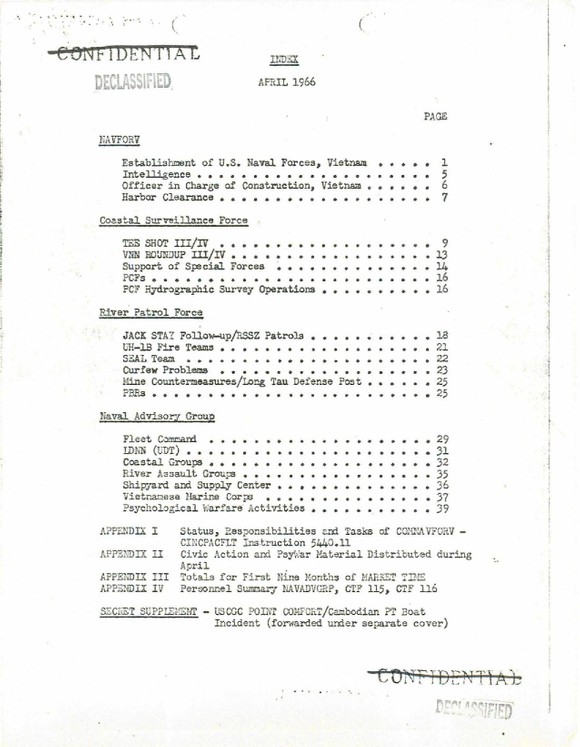
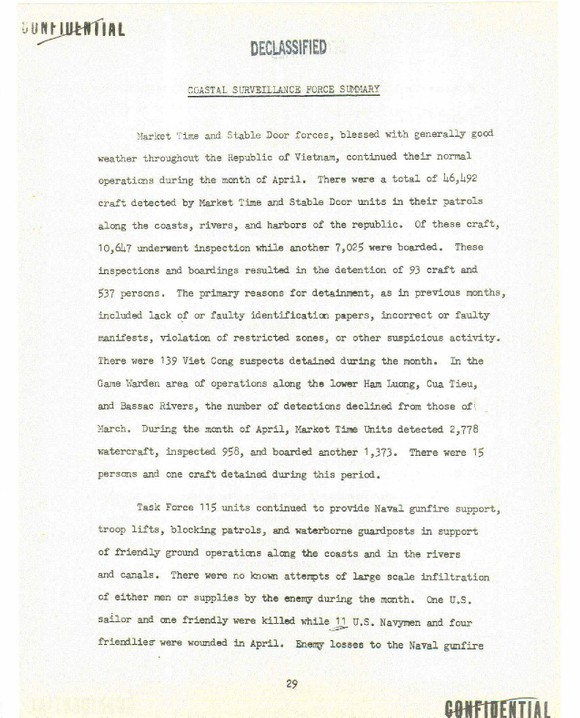
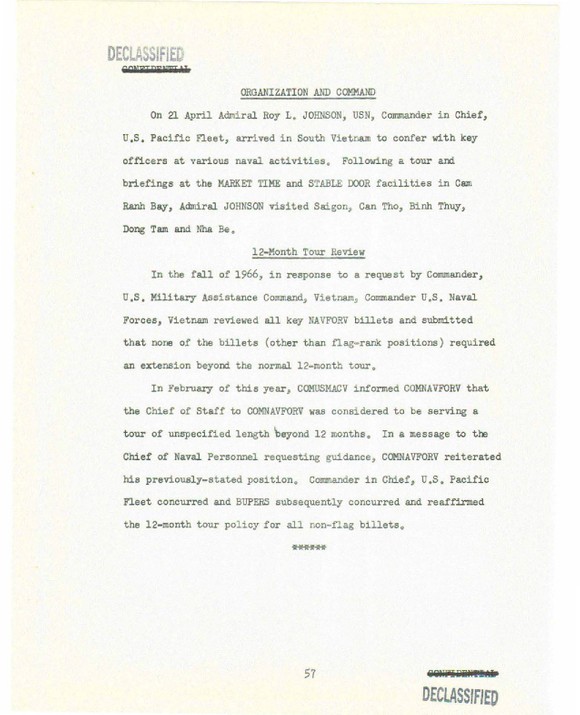
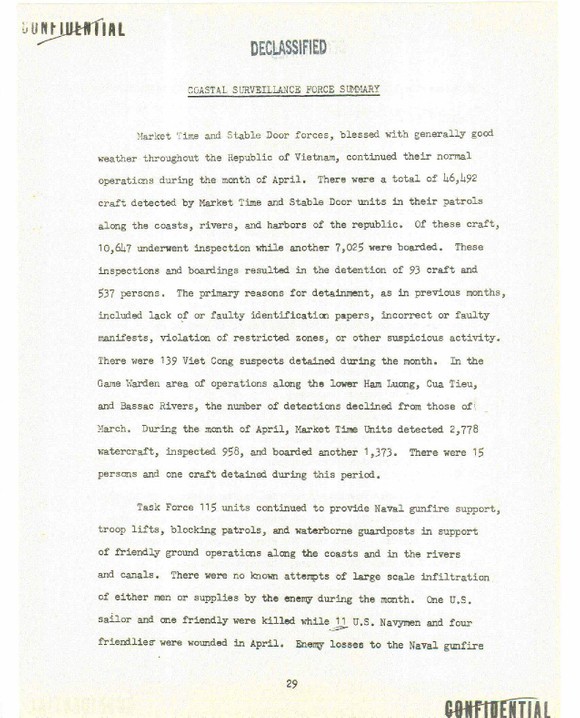
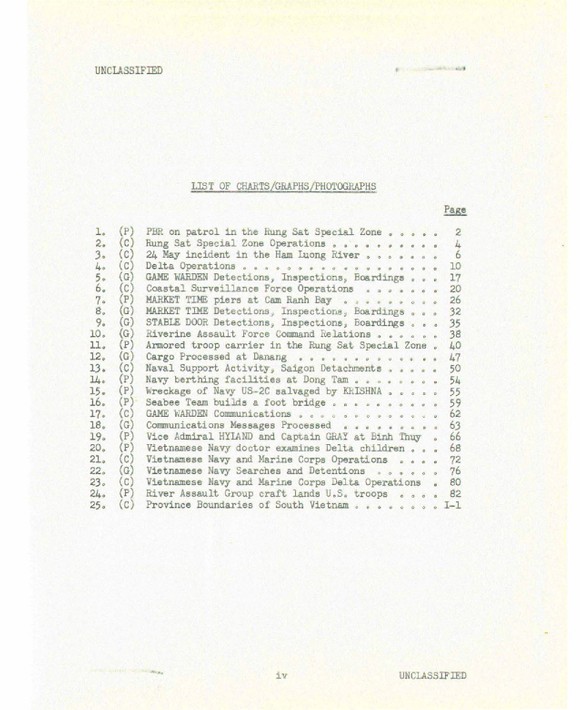
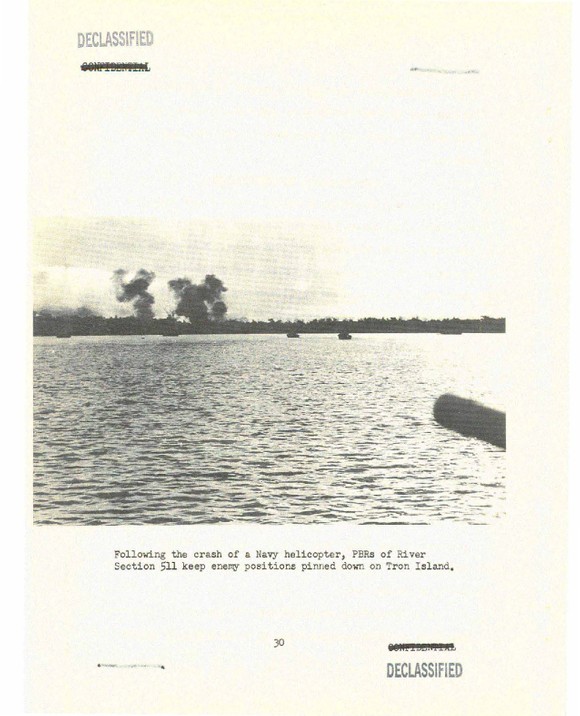
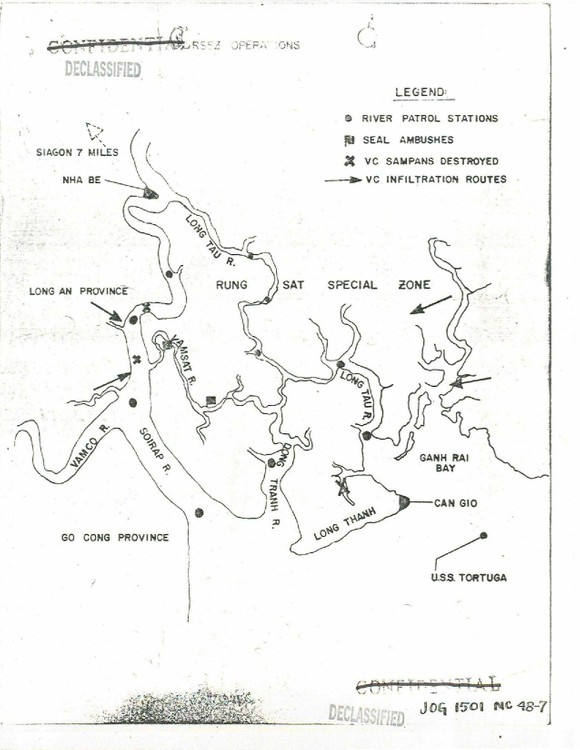
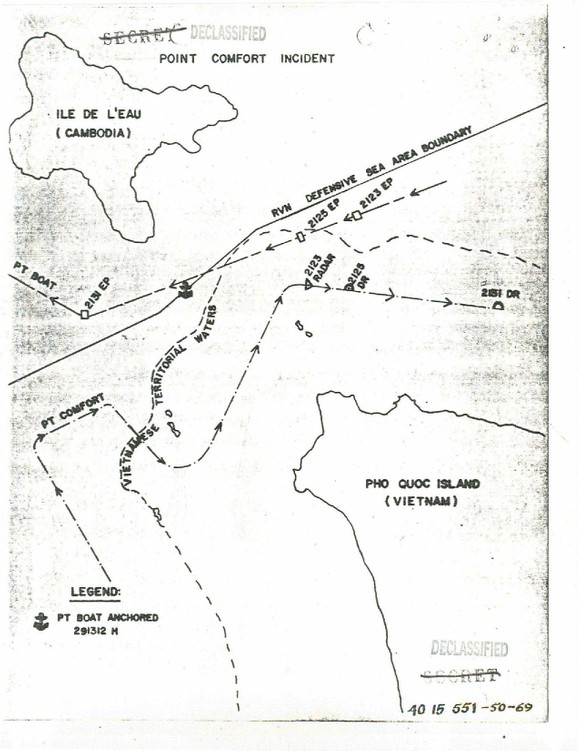
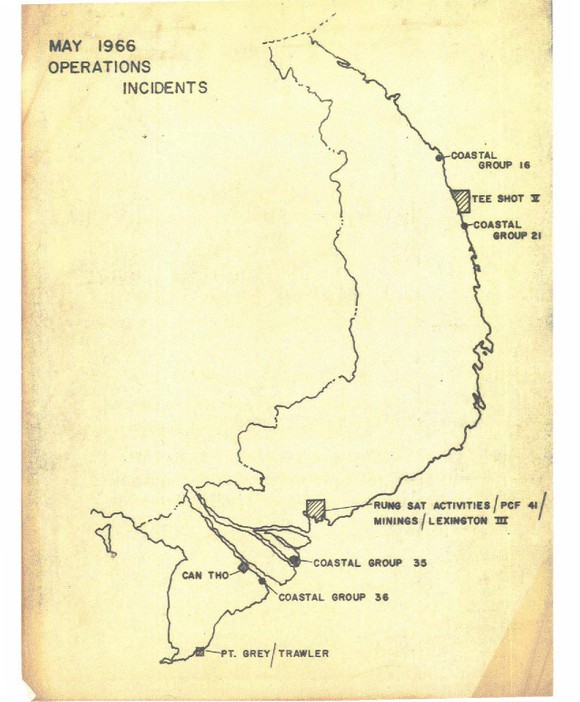


7,728 pages of monthly reports, covering the actions of the U.S. Navy during the Vietnam War, produced under the direction of the Commander U.S. Naval Forces Vietnam.
The Commander U.S. Naval Forces, Vietnam (COMNAVFORV) was the senior naval official in Vietnam. The monthly reports cover activity from April 1966 to December 1971, and the quarterly chronologies from January 1972 to March 1973. Of special note is the coverage of Navy SEAL team operations.
During the Vietnam War, the United States Navy engaged in action along South Vietnam, North Vietnam, Laos and Cambodia, and within the South China Sea, the Gulf of Siam, the Philippines, Thailand and the western Pacific. From the start of American intervention through the first few months of 1965, the U.S. Navy's role in Vietnam was limited to support functions in the Saigon region, construction, medical activities, and advising the Vietnamese Navy and the Vietnamese Marine Corps.
On March 24, 1965, U.S. naval forces began Operation MARKET TIME, its first operational action, using naval units for counter-infiltration patrols. Four months later the operation expanded to include surveillance aircraft, U.S. Coast Guard units, and high speed PCP coastal patrol craft (SWIFT boats).
Using mostly river patrol boats (PBRs), the Navy in late 1965 began its second sizable operation, GAME WARDEN. Operation GAME WARDEN assisted the activity of South Vietnamese naval patrols in the Mekong Delta and along the Rung Sat Special Zone waterways. This lead to the need for the Navy to provide harbor defenses, mine clearance and harbor support facilities.
The increase in naval activity created the need for a central, lead coordinating command based in theatre. A major command with a flag officer stationed in Saigon, running all U.S. Navy activities assigned to the Military Assistance Command, Vietnam.
On April 1, 1965, the Command Navy Forces Vietnam (COMNACFORV) was established. COMNAVFORV is used to refer to both the command and the commander, the senior naval officer in Vietnam, of the U.S. Military Assistance Command, Vietnam.
The reports include coverage of Navy operations and actions during the Vietnam War.
The reports cover the Coastal Surveillance Force activities of Operation MARKET TIME and Operation STABLE DOOR units. The River Patrol Force activities conducted by the Rung Sat Special Zone River Patrol Group, Delta River Patrol Group, Operation GAME WARDEN units, I Corps River Patrol Group, Riverine Strike Group, the Riverine Assault Force, and Task Force CLEARWATER. The administrative, reinforcement, and construction endeavors of the Third Naval Construction Brigade, U.S. Naval Support Activity Danang and U.S. Naval Support Activity Saigon.
Additional sections of the reports focus on Military Civic Action, Psychological Operations, Special Operations, Religious Activities, Communications, Organization and Command, and the U.S. Navy's role as advisor to the Vietnamese Navy and the Vietnamese Marine Corps.
The reports often include charts, graphs, chronologies and photographs.
Included among the operations mentioned in the thousands of pages of reports are:
Operation MARKET TIME
On February 16, 1965, in what became known as the Vung Ro Bay Incident, a U.S. pilot spotted, and South Vietnamese forces intercepted a trawler in the Vung Ro Bay in northern Khánh Hòa Provence. The trawler was unloading arms and ammunition. This interception gave new light on the North Vietnamese methods employed in their arms supply chain. The North Vietnamese were using 100 foot long Chinese made freight trawlers to deliver arms to the Viet Cong in South Vietnam.
This discovery lead to the establishment of Operation Market Time, an attempt to form a blockade of the South Vietnam coastline to prevent North Vietnamese supply trawlers from delivering arms. This named operation was in effect for eight-and-a-half years. The activity coordinated under MARKET TMARKET was previously designated as Coastal Surveillance Force, Task Force 115. MARKET TIME mostly used Fast Patrol Craft (PCF), or "SWIFT" boats capable of traveling 23 knots, and were usually armed with .50-caliber machine guns and 81-millimeter mortars.
The majority of contacts made by Navy personnel performing Operation MARKET TIME duties occurred during routine inspections of papers and cargo of civilian vessels. MARKET TIME also involved the use of Coast Guard patrol boats and cutters and radar picket escort ships, coastal and ocean-going minesweepers, patrol gunboats, SP2H Neptune and P3A Orion aircraft harbor defense units.
As the effectiveness of MARKET TIME grew, the North Vietnamese increased its use and the capacity of the Ho Chi Minh Trail. Navy Commander R. L. Schreadley, in 1970 wrote about the operation, "By almost all measurable criteria the task forces had achieved a high degree of effectiveness. There had been no known attempts to infiltrate large shipments of men or arms into South Vietnam by sea since the Tet Offensive earlier in the year."
Operation GAME WARDEN
In December of 1965, the United States Navy and the Vietnamese Navy entered into a joint operation, GAME WARDEN. The goal of this operation was to use United States Navy and the South Vietnamese Navy watercraft to disrupt any personnel movement or resupply efforts on the major rivers of the Mekong Delta and the Rung Sat Special Zone (RSSZ) by Northern forces.
Operation DECKHOUSE V
Launched on the 6th of January 1967, Operation DECKHOUSE V was the first combined U.S./Vietnamese amphibious operation on the Mekong Delta. The goal of the operation was to capture Viet Cong in the Thanh Phong Secret Zone in Kien Hoa province and turn the POWs over to the Army of The Republic of Vietnam. Successful prisoner captures were fewer than expected. U.S. and Vietnamese marines encountered little resistance ashore amid indications that the main force of Viet Cong had fled from the area. The operation was terminated 15 January.
Action of 1 March 1968
On 1 March 1968, the North Vietnamese attempted to contest the Operation MARKET TIME blockade by attempting to run four trawlers of weapons to the shore. The combined efforts of United States Navy, Coast Guard, Army, Air Force, and South Vietnamese forces destroyed two ships, one trawler was forced to turn and flee, and the crew of the fourth trawler scuttled their ship.
Operation JACKSTAY
In late March 1968, the Navy launched its first major operation of the Vietnam War in the Rung Sat Special Zone (RSSZ). Rung Sat Special Zone was the name given by the South Vietnamese and American forces to a 400 square mile section of the Sác Forest. The Sác Forest comprises 1256 square km of tidal mangrove swamp including over 4800 km of interlocking streams, located approximately 36 km south of Saigon. The Viet Cong considered this swamp, thickly covered by tropical vegetation, a safe area for arms factories, recuperation, and training camps.
Operation JACKSTAY was a full scale naval amphibious operation penetrating into the waterways of the Mekong Delta, from the high seas and coastal waters. Before this, Navy activities were mostly inshore operations using SWIFT boats, the fast patrol craft used by coastal surveillance forces. The target of the operation was Viet Cong undertakings in the RSSZ.
The Navy considered JACKSTAY to be important because it showed that wherever water reached the authority of the US Navy could follow.
Operation SEA LORDS
October 1968 saw the launch of Operation SEA LORDS, a joint operation between United States and South Vietnamese forces. SEALORDS was an acronym abbreviating the phrase, Southeast Asia Lake, Ocean, River, and Delta Strategy.
This operation brought together for the first time during the Vietnam War all three U.S. Naval Task Forces in service in Vietnam. SEA LORDS originally had three objectives. First, the interdiction of Viet Cong infiltration routes from Cambodia along canals from the Bassac River to the Gulf of Thailand. Second, pacification of selected Trans-Delta waterways. Third, pacification and clearance of the Bassac Islands, namely Tan Dinh and Dung Islands.
As part of President Richard Nixon Administration's Vietamization of the Vietnam War, all Operation SEA LORDS's functions were turned over to the South Vietnamese Navy.
Other operations of interest also covered in these reports include: Operation STABLE DOOR, Operation PREAKNESS III, Operation WIND SONG I, Operation BARRIER REEF, Operation SILVER MACE II, Operation READY DECK, Operation SONG ONG DOC, Operation SEA FLOAT, Operation WOLF PACK, Operation BLUE SHARK, Operation SOLID ANCHOR, Operation SEARCH TURN and Operation BREEZE COVE.
The reports include detailed narratives of actions taken during special operations by Navy SEAL teams. The report for January 1968 includes this account of a mission conducted by Navy Seals:
"Shortly before midnight on the night of 22 January, two squads of SEALS were landed on the north bank of the Mekong river, 4 1/2 miles east of Sa Dec, Squad 6A patrolled northwest about a half mile and established an ambush site. At 0200 the following morning, they opened fire on an unlighted sampan, killing the four Viet Cong occupants. The squad then moved to the southeast a short distance where they killed two more of the enemy detected in yet another unlighted sampan. The squad moved in a southeasterly direction to await a rendezvous with Squad 6B. Squad 6B, after landing, had patrolled to the northwest. In reaction to 6A's initial contact, an estimated seven Viet Cong in the vicinity of Squad 6B opened fire from the north bank of the Tien Gang River in the direction of Squad 6A. The SEALs established a hasty ambush and laid in wait. Shortly thereafter Viet Cong on the south bank of the river returned the fire from their comrades on the north bank. Several cries of pain were heard as the Viet Cong exchanged fire between themselves. Still undetected, Squad 6B initiated their ambush at 0203 on the 23rd, directing their fire simultaneously on a sampan with one occupant aboard and at the Viet Cong on the north bank of the river. The lone Viet Cong was killed. Casualties to group on the north bank were unknown. As the squad left their ambush site and headed for a join-up with Squad 6A, they contacted and killed one more communist insurgent. The SEALS finally withdrew from the area at 0430 after achieving eight kills. There were no U.S. casualties."











1 file (802.4MB)



